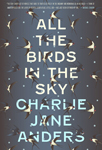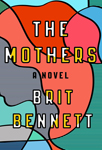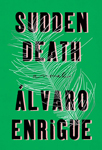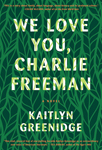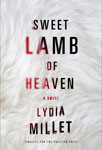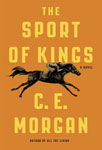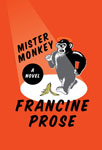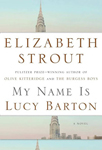by Charlie Jane Anders
Buy it at Powell’s »Tim Rinehart: I read Version Control at work in my lab. I was there all weekend in order to collect samples for a gene expression experiment on diseased dogwoods. I was alone and needed something to do when I wasn’t dissecting leaves and flash-freezing them in liquid nitrogen. Doing science, while reading about science, seemed ideal. Lately, I’ve been feeling sad about being a USDA-ARS scientist, especially one who works on flowering trees and shrubs. The back copy for Version Control promised an exploration of the “effects of science and technology” on life, friendships, and sense of self. Salvation! Maybe I wouldn’t have to rely on parody political Twitter accounts to validate my life anymore.
I loved Version Control. I immediately identified with Philip, the federally funded physicist obsessed with causality. Philip is a nerd. His lab is full of nerds. Dexter Palmer seems to know a thing or two about nerds, especially middle-aged geeks like myself. Philip plays drums to “Fly by Night.” I love early Rush. Philip obsesses over Blade Runner. I quote J.F. Sebastian in conversation. Palmer includes references to Star Trek: Deep Space Nine. I wear a Wesley Crusher hoodie, which is The Next Generation but close enough. I’m also a graduate of Case Western Reserve University, so when Palmer drops the Michelson-Morley experiment, I’m down. I even lived in Michelson House. It was a flaming concrete silo full of future astronauts, doctors, and engineers in fields that hadn’t even been invented yet. Biomedical engineers! CWRUnet was completely fiber-optic and our flame wars made Usenet look silly. And we had the holy ASCII Grail award. This is why I felt a strong connection with Version Control.
Until I didn’t.
I began to see Philip as a well-researched facsimile. I started twitching when Philip and Rebecca met at the sculpture garden and he had to touch all the art. I was in spasms by the time I read Phillip’s diary that he hid in the comments of his code.
// Remember Patton Oswalt’s 2010 polemic in Wired?
I wanted to annotate and reconsider every other page. While reading Version Control, I became Philip watching Blade Runner:
“The problem with watching Blade Runner,” Philip said as he pulled out a folder full of Blu-rays from the briefcase and began to look through them, “is that there are five different cuts of this movie, and none of them is perfect. They all have strengths and weaknesses. So what would probably be best is if I do a sort of curated exhibition of the movie; every once in a while I’ll switch from one cut to another, and explain what the differences are between versions. You’ll get a lot more out of your first experience if you watch it that way.”
That’s how I ruined Version Control, which is surprising because I thought I had a high tolerance for geek appropriation. Years ago I spent nights drinking with Curtis “Mencius Moldbug” Yarvin, supergeek and emergent philosopher-emperor of the alt-right. Recently he published an intellectual justification for the complete, intentional destruction of the democratic republic known as America so it could be rebuilt with technology-loving overlords. Even though his blog was repurposed to support fascism, I still love Moldbug. Mostly because Urbit, but also because there’s a lot of tolerance and good intention among geeks. Version Control has good intentions. Yet somehow I couldn’t love it. The science references that drew me in were unfulfilled promises. Michelson-Morley is not just a famous failed physics experiment: Albert and Edward started an entire field of study, built lots of devices, and both went on to do other amazing science. In Version Control, Philip et al. build a time machine, but afterward they all stopped evolving, both as scientists and as characters in the story. Even an uber-geek like Curtis is probably revising his homily, maybe even qualifying his reservations right now in light of new evidence.
Nobody really changes in The Mothers either, and that might be the point. And while nobody builds a time machine, Nadia desperately longs for one:
In her bed, she believed the impossible. She felt herself growing younger, her skin softer and tighter, her mind unfilled with the textbooks she’d read. Luke uncrippled, unswallowing aspirin by the palmfuls. Unloving Aubrey. He kissed Nadia and she felt untouched, their baby unforming inside of her, their lives separating.
I read The Mothers at home, which means I was constantly interrupted by my five kids, two of whom are adopted teenagers. We live in a worn-down farmhouse that is 100 years old and too small. Every day is loud and bursting with drama. My oldest daughter is a biracial 14-year-old foster kid from rural Mississippi. She frequently reminds me of the importance of belonging. It breaks my heart. The relentless damage in The Mothers broke my heart too. A football player’s leg is crushed. A tiny heart is stopped during abortion. Promises are broken and friendships crumble. Yet I found The Mothers inescapable. The narrative unfolds with such symmetry that it was easy to dip back into the cadence and voice of Brit Bennett after interruptions. The story is vague in parts, but written with such economy and precision that it never gets snagged or spins off into tangents.
The Mothers was tightly woven and Version Control felt sloppy and incongruent in comparison. But I didn’t find The Mothers as interesting as Version Control. After contemplation, I agree with Philip that “interesting” is the “most precious of compliments,” which is why I’m sending Version Control on to the next round.
If botany has taught me anything, it’s that set and setting are vital to a good time. I didn’t hold back in my excitement for Version Control, and it got messy but also a little surreal for me. For a story about time travel, that’s a good thing. The Mothers was powerful and finely crafted, but my world right now is powerless, confused, and illusory. Scientists are planning protest marches. There are no time machines. History has made us who we are.
Match Commentary
By Dustin Kurtz & Nozlee Samadzadeh
Nozlee Samadzadeh: Hi Dustin! You are currently in Grand Cayman selling books, although you used to be in New York selling books. Can you introduce yourself a bit?
Dustin Kurtz: Hi Nozlee. I am in Grand Cayman! I generally try to play it off when people seem too taken with the idea of living in the Caribbean—a lot of talk about how I’m in an office staring at a screen all day like anyone else—but today the store was closed and I made it to the beach and only ran over like three iguana carcasses in my car, so I’m feeling enthusiastic about this place.
Books & Books Grand Cayman is a fun little outpost of one of the major names in American indie bookselling here on a tiny island south of Cuba. We’re pretty large and stock a big selection, with a focus on Caribbean literature and fiction generally. We’ve been stocking both of the books under consideration today, so if anyone feels driven to an act of consumer justice by the decision above, jump a plane down, I have them. Buy both books and I can show you the tree where Tom Cruise filmed the fuck scene in The Firm.
Nozlee: What do you think of today’s judgment? You’ve certainly heard of (and maybe read) both books.
Dustin: Nozlee, you can attest that I have a lot of qualms about jumping into this one, even just to do commentary. I’m a white cis man being given license to talk about two novels by authors of color, which isn’t ideal. In the case of Bennett, the book is a celebrated debut by a woman as well. Both books have race at their core. Fortunately the judgment was extremely straightforward so I guess there’s no problem here (*wink emoji flooding endlessly down the page, welling up out of your screen, drowning you where you sit*).
Nozlee: Did you expect this outcome going into it?
Dustin: This judge is interesting as hell. What a great reader. I really liked his decision—not because I think it was correct, but because it was just one guy voting for the thing with which he most identified. (While talking about his dorm room kind of a lot and pitching an app made by a fascist I’m not going to bother googling? I love this tournament.) Also, diseased dogwood sounds fascinating. That’s my new rule: I only read book reviews by people out there studying diseases for things I’d vaguely forgotten could be diseased.
I’ll say that I expected The Mothers to advance, for much the same reasons the book was lauded when it came out—it’s a debut that shows strong control, and feels pretty current. But this doesn’t feel like an upset to me. Version Control is an ambitious book, a thrillingly executed and humane book. It’s tempting to say it simply found the right reader with Judge Rinehart, but critical reception for this thing was pretty exclamatory across the board.
Also, considering Thursday’s decision, this might really be a year for genre-inclined books going all the way. I’m eager to see how the Millet fares.
I want to talk about Rinehart’s structure of tightly crafted versus interesting books in a second here, too, but let’s take a moment to talk about abortion.
Nozlee, I’m so glad I agreed to do this. So glad.
The plot of Bennett’s novel turns around the slow revelation that a young woman had an abortion when she was 17. I found The Mothers less heartbreaking than Rinehart did, and maybe—I’m assuming a lot here—our different thinking about abortion is a part of that. Let me just say that Bennett’s treatment of the subject is worth reading and leave it there.
Nozlee: Now we’re really in it! Let’s get back to the “tightly crafted versus interesting” thing.
Dustin: Bennett’s book is “tightly woven” in sentence structure, yes, but even thematically this sense of constriction is marvelously persistent. It’s one reason I expected the book to do better. Bennett is at her best when her characters are too much with themselves, bodies jostling for space in cramped rooms and hallways. She’s a good writer of the claustrophobia of hometowns and tight communities and our banging against the walls of ourselves and our expectations for how intimacy should operate. In any case I’m a sucker for bodies well-written into the spaces around them. Then again, Palmer’s characters are written into the space-time around them, so—
Did you see what I did there? Man I’m good. Are we being paid for this? I should be paid for this.
About Version Control, Judge Rinehart is right. It’s a baggy book in a very genre fashion. It has infodumps. Characters monologue or say things that are meant to be clever. The characters have internal voices very similar to those in thrillers. They can at times become a bit cartoonish—and not in like a wink wink, nod nod, we’re living on the wrong branch of a causality tree kind of way. This is some of what he’s getting at when Rinehart says the depiction of nerd culture isn’t entirely right, I think. But Palmer’s book is also fun as hell, heartfelt, and genuinely gee-whiz interesting. It’s good in exactly the ways that matter most to genre readers—readers like Rinehart, readers like me.
Wait, no, I actually hate fun, in literature and generally. I flew a kite with my kid this morning on a white sand beach, but I promise I was scowling the whole time.
Nozlee: Oh, I believe it.
Dustin: One of the things I love best about this tournament is that judges find themselves forced to take grand aesthetic stances—tightly woven versus messy and interesting—but I think it’s revelatory that Rinehart spent the most time discussing why he felt such a kinship with Version Control.
And that is absolutely how most people read fiction, myself not excepted. People read for moments of intense recognition. If we’re gonna be out here on the internet just chucking two books at each other, why not make critical decisions the same way they’re made in every book club in every book store and living room and bar around the country? A judgment system like this—is this book accurate to how I envision myself in this book—makes as much sense as any other damn thing.
Nozlee: The Tournament of Books—it makes as much sense as any other damn thing. Thank you for the new tagline, Dustin, and for joining us!
Kevin Guilfoile: And just dropping in to note that we have to say a final goodbye to The Mothers. It did not receive enough Zombie votes, so All the Birds in the Sky and The Vegetarian will remain our reanimated nightmares for now.
Writer Miranda Popkey will be the judge tomorrow as Grief Is the Thing With Feathers takes on Homegoing. Kelsey Ford and Katherine Kearns from Skylight Books in LA will take over the commentary.
Nozlee: Our sports-themed play-in round may be over, but the football-inclined among us may also enjoy Judge Popkey’s review of The Throwback Special on the New Yorker’s Page-Turner blog, as well as End Zone, the column about the 2012-13 NFL season that she wrote for The Morning News.



